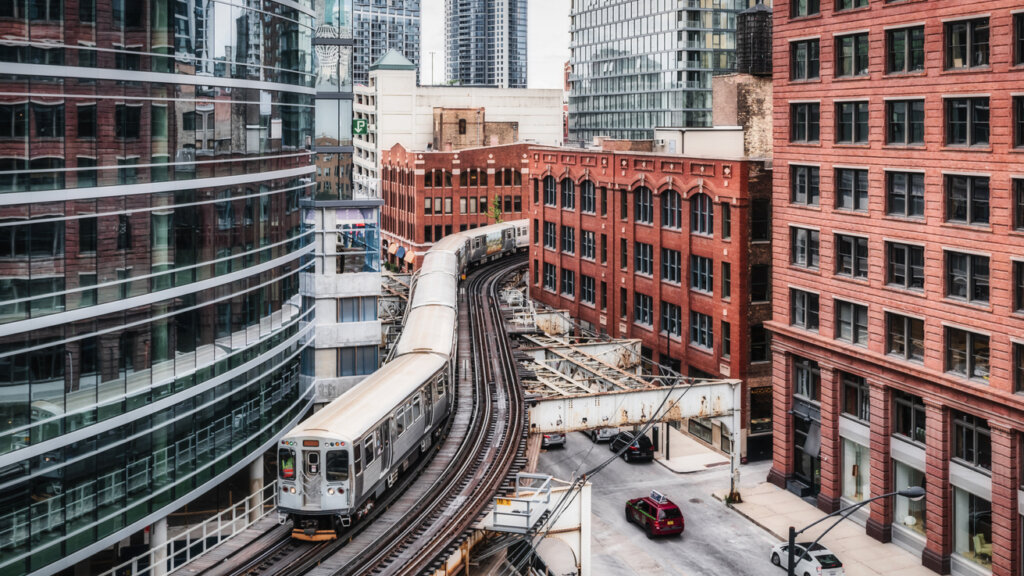2023 City of Chicago Policy Agenda

The independent Metropolitan Planning Council (MPC) works with governments, businesses, community leaders, and advocacy groups to promote racially equitable and environmentally sustainable planning and policy solutions necessary for every neighborhood to thrive. To this end, MPC’s work focuses on creating Thriving Communities, Equitable Infrastructure and Just Public Systems. This framework captures the vision for the region we seek to advance through collaborative policy development and advocacy.
Thriving Communities
All communities should have the resources needed to thrive, including accessible and affordable housing, healthy and resilient neighborhoods and community-centered planning and engagement. Policies below support inclusive growth, jobs, housing and neighborhoods as well as community wealth building. MPC will continue to support legislation that expands affordable housing supply through preservation strategies and new production and protects vulnerable residents from unnecessary displacement. These policies also mitigate historic harms and improve public health and environmental outcomes in BIPOC communities.
Encourage industrial land use practices and policies that protect environmental and human health, and promote resilience.
Revise existing industrial corridor development. Many of Chicago’s land use and zoning policies were enacted decades ago, prior to the integration of practices for meaningful community engagement. As a result, many industrial developments undermine health, community, and connectivity. The City needs to implement community-driven industrial corridor planning that prioritizes human health, environmental health, and economic development opportunities. As part of this process, the City should adopt strategic planning for the equitable placement of transportation, distribution and logistics facilities.
Strengthen permitting and enforcement procedures in industrial corridors. Weak permitting criteria and lax enforcement of regulations for industrial violations have created ongoing challenges in environmental justice communities that are home to industrial users. MPC supports a cumulative impacts ordinance that incorporates health impacts into industrial permitting criteria. We also support improved tracking and enforcement of industrial violations by increasing the number of City staff dedicated to this effort.
Equitable Infrastucture
Public and private investments need to adopt inclusive development standards and support sustainable infrastructure for all communities. These policies increase use of performance-based methods to guide infrastructure funding. Policies must also increase the amount of public and private investments in historically disinvested communities.
Increase the safety of our roads, particularly for pedestrians and bicyclists
Accelerate implementation of Vision Zero. Every Chicago resident deserves to get where they are going without worrying about becoming a victim of a traffic crash. Vision Zero is Chicago’s pledge to eliminate traffic related fatalities and serious injuries. MPC advocates for improving the design of roadways to prioritize the safety of people biking and walking and to reduce vehicle speeds. The city should accelerate implementation of Neighborhood Safety Plans and Complete Streets Quick Delivery projects.
Accelerate implementation of protected bike lane network. Protected bike lanes improve the safety of cyclists; importantly, they also help cyclists feel safer, thereby eliminating perception of safety as a barrier to cycling by people of all ages and abilities. The City should accelerate delivery of this vital bicycle infrastructure.
Target accessible improvements to transit station areas. To make transit equitable, it needs to be accessible. Stations and the sidewalks near them need to be designed for the needs of all residents who use them, and must include considerations of ADA access, public safety, and adequate lighting.
Protect the health of Chicago residents by ensuring reliable, safe drinking water.
Accelerate equitable lead service line replacement. After decades of inaction, the City of Chicago in 2021 initiated a lead service line replacement program informed by a detailed plan and funded by state and federal resources. Yet the program has made scant progress. The City must accelerate equitable replacement by enhancing engagement and scaling up replacement to the block level.
Reduce flooding by investing equitably in green and gray infrastructure.
Facilitate stormwater credit trading. As climate change increases heavy rainfall events in the City and region, we will need innovative solutions to help capture stormwater and keep it from overwhelming our sewer systems and inundating our homes. Stormstore – a joint project from MPC and the Nature Conservancy – increases the stormwater management capacity of the region by investing in green infrastructure in disinvested neighborhoods. MPC supports legislative and administrative changes to enable Stormstore to deliver on its promise. Specifically, MPC supports updating Chicago’s federal pollution discharge permit (NPDES) to enable stormwater credit trading as a method of compliance.
Update stormwater regulations. The City of Chicago relies on outdated rainfall data to plan for its infrastructure. In the face of global climate change, the City will need to adopt new standards to ground its infrastructure planning. The City should adopt Bulletin 75 to account for updated rainfall data in private development. Additionally, the City should update its stormwater regulations to allow for new climate mitigation technologies, such as StormStore.
Develop and implement a citywide green infrastructure strategy in coordination with sister agencies. With the acceleration of climate change and the impact of urban flooding, the time is now to make nature-based solutions a part of the City of Chicago’s infrastructure toolkit. This will mean bringing together multiple departments and sister agencies, like the Chicago Park District, in order to make meaningful and sustainable impact. MPC stands ready to support the City in such an effort.
Ensure equitable operation of transit – now and into the future.
Implement Bus Rapid Transit. The city seeks to incentivize development along bus corridors via the Connected Communities ordinance. It will be critical that bus frequency, accessibility, and speed are improved to ensure transit is an attractive option for residents. Bus Rapid Transit (BRT) offers an ideal solution: it can operate at nearly the same trip speeds as CTA rail and be built for a fraction of the cost. CTA should publish the Better Streets for Buses plan it has long promised and make high-speed, high-quality transit accessible to all the city’s neighborhoods. In 2023 the City should identify priority BRT projects and begin to apply for federal funding via the Bipartisan Infrastructure Law.
Improve Transit Experience to Boost Transit Ridership. The City must work with CTA to ensure transit riders feel safe and comfortable and that transit is the most attractive option to get around. This will mean collaboration among city agencies to proactively address a range of social service and other needs that can negatively impact transit. CTA must prioritize hiring to ensure it has the staff to run all the service scheduled and that riders can depend on transit.
Make public incentives work for every community.
Prioritize Equitable Investment. Equity should be at the center of how development is supported across the city. Public financial incentives like Tax Increment Financing can and should be part of the solution to ensure under-invested communities have good jobs, access to transit, parks, and open space, affordable housing, retail and entertainment. MPC advocates for developing and tracking equity outcomes in a transparent and effective way, aligning incentive use with priority areas and criteria, streamlining the application process to support less resourced applicants, providing better communication and funding support and improving accountability of incentive programs.
Just Public Systems
The public sector needs tools and internal capacity to transform inequitable systems. Additionally, government processes and structures may need to be transformed to make them more transparent and fair for all. These policies lead to codified structures, government policies and programs that advance racial equity and inclusion, sustainability, and civic participation. These policies also increase community stakeholder representation that impacts government decisions.
Strengthen standards for citywide and neighborhood planning.
Institutionalize the use of health and racial equity analysis tools in city policy development and land use decisions. Support City departments in identifying opportunities to operationalize health and racial equity analysis tools in policy, land use, and procurement decisions.
Promote equitable, healthy, and resilient communities through zoning and land use. Zoning and land use shape Chicago’s neighborhoods and the way that residents interact with their environments. Every neighborhood should provide residents with the opportunity to thrive. MPC is assessing the Chicago Zoning code through a health, equity, and environmental lens to determine positive changes that support vibrant communities across the city and mitigate the harm that historic zoning practices have caused.
Plan Sustainably for Our Great Rivers. Through the River Ecology and Governance Task Force, MPC and partners in the government, civic, community, and academic sectors collaborate to advance land use policies and practices across Chicago’s riverfronts that promote the health of communities and ecological systems. MPC supports updates to Chicago’s Sustainable Development Policy, the Chicago River Design Guidelines, and ongoing development review processes that balance recreation, nature, and connectivity across all our rivers.
Strengthen department capacity to plan for and cultivate thriving communities.
Staff up at CDOT to accelerate transit and bike/walk planning and projects. CDOT is woefully understaffed to plan for and implement sustainable modes of transportation. Without increased staff capacity, Chicago will struggle to meet many of its transportation and climate goals. The city should invest resources in more transportation planners who can help design and think systematically about bike/walk and transit projects, to improve access to affordable, equitable, healthy transportation as well as implement goals in the Climate Action Plan.
Ensure full implementation of the Connected Communities Ordinance. In 2022, Chicago adopted ambitious policy measures to incentivize equitable development near transit stations across the City. To make good on these incentives, the City needs to increase capacity to both expand the construction of ETOD and increase transparency and accountability to equitable outcome measures.
